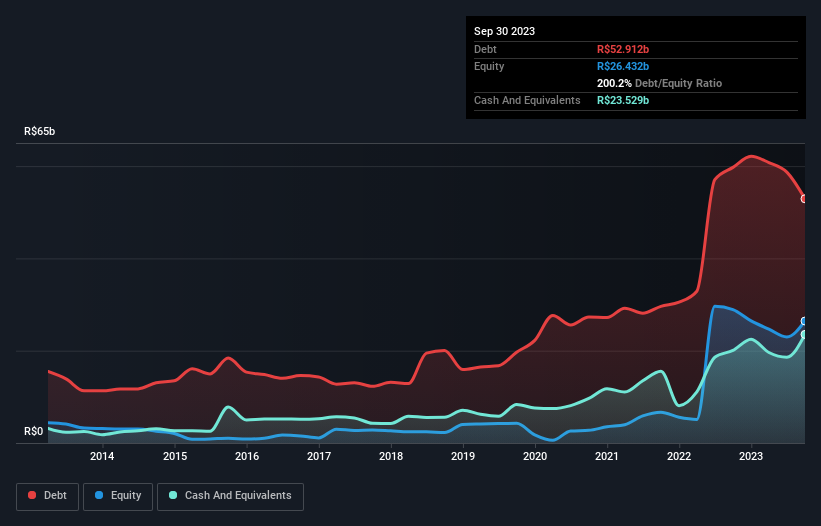
David Iben put it well when he said, 'Volatility is not a risk we care about. What we care about is avoiding the permanent loss of capital.' It's only natural to consider a company's balance sheet when you examine how risky it is, since debt is often involved when a business collapses. As with many other companies Marfrig Global Foods S.A. (BVMF:MRFG3) makes use of debt. But is this debt a concern to shareholders?
When Is Debt A Problem?
Debt is a tool to help businesses grow, but if a business is incapable of paying off its lenders, then it exists at their mercy. In the worst case scenario, a company can go bankrupt if it cannot pay its creditors. However, a more usual (but still expensive) situation is where a company must dilute shareholders at a cheap share price simply to get debt under control. By replacing dilution, though, debt can be an extremely good tool for businesses that need capital to invest in growth at high rates of return. The first thing to do when considering how much debt a business uses is to look at its cash and debt together.
See our latest analysis for Marfrig Global Foods
What Is Marfrig Global Foods's Net Debt?
As you can see below, Marfrig Global Foods had R$52.9b of debt at September 2023, down from R$59.7b a year prior. However, because it has a cash reserve of R$23.5b, its net debt is less, at about R$29.4b.

How Strong Is Marfrig Global Foods' Balance Sheet?
The latest balance sheet data shows that Marfrig Global Foods had liabilities of R$44.4b due within a year, and liabilities of R$63.1b falling due after that. On the other hand, it had cash of R$23.5b and R$9.95b worth of receivables due within a year. So its liabilities total R$74.0b more than the combination of its cash and short-term receivables.
This deficit casts a shadow over the R$9.13b company, like a colossus towering over mere mortals. So we definitely think shareholders need to watch this one closely. At the end of the day, Marfrig Global Foods would probably need a major re-capitalization if its creditors were to demand repayment. There's no doubt that we learn most about debt from the balance sheet. But ultimately the future profitability of the business will decide if Marfrig Global Foods can strengthen its balance sheet over time. So if you're focused on the future you can check out this free report showing analyst profit forecasts.
In the last year Marfrig Global Foods wasn't profitable at an EBIT level, but managed to grow its revenue by 22%, to R$138b. Shareholders probably have their fingers crossed that it can grow its way to profits.
Caveat Emptor
Even though Marfrig Global Foods managed to grow its top line quite deftly, the cold hard truth is that it is losing money on the EBIT line. Indeed, it lost a very considerable R$3.5b at the EBIT level. When you combine this with the very significant balance sheet liabilities mentioned above, we are so wary of it that we are basically at a loss for the right words. Like every long-shot we're sure it has a glossy presentation outlining its blue-sky potential. But the reality is that it is low on liquid assets relative to liabilities, and it lost R$6.0b in the last year. So we're not very excited about owning this stock. Its too risky for us. When analysing debt levels, the balance sheet is the obvious place to start. However, not all investment risk resides within the balance sheet - far from it. For example - Marfrig Global Foods has 3 warning signs we think you should be aware of.
Of course, if you're the type of investor who prefers buying stocks without the burden of debt, then don't hesitate to discover our exclusive list of net cash growth stocks, today.
If you're looking to trade Marfrig Global Foods, open an account with the lowest-cost platform trusted by professionals, Interactive Brokers.
With clients in over 200 countries and territories, and access to 160 markets, IBKR lets you trade stocks, options, futures, forex, bonds and funds from a single integrated account.
Enjoy no hidden fees, no account minimums, and FX conversion rates as low as 0.03%, far better than what most brokers offer.
Sponsored ContentNew: Manage All Your Stock Portfolios in One Place
We've created the ultimate portfolio companion for stock investors, and it's free.
• Connect an unlimited number of Portfolios and see your total in one currency
• Be alerted to new Warning Signs or Risks via email or mobile
• Track the Fair Value of your stocks
Have feedback on this article? Concerned about the content? Get in touch with us directly. Alternatively, email editorial-team (at) simplywallst.com.
This article by Simply Wall St is general in nature. We provide commentary based on historical data and analyst forecasts only using an unbiased methodology and our articles are not intended to be financial advice. It does not constitute a recommendation to buy or sell any stock, and does not take account of your objectives, or your financial situation. We aim to bring you long-term focused analysis driven by fundamental data. Note that our analysis may not factor in the latest price-sensitive company announcements or qualitative material. Simply Wall St has no position in any stocks mentioned.
About BOVESPA:MRFG3
Marfrig Global Foods
Through its subsidiaries, operates in the food industry in Brazil and internationally.
Good value with mediocre balance sheet.
Similar Companies
Market Insights
Community Narratives



